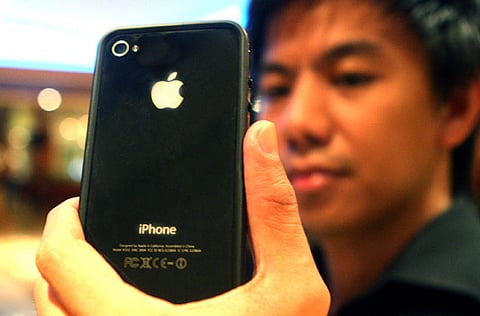iPhone users, mind your data to avoid deficit shock
Lack of awareness responsible for people running up high bills, say experts

Dubai: iPhone users complaining of high bills have only themselves to blame, experts say.
Of late there has been a number of customers complaining about disappearing phone credits, but Adnan Yousuf, marketing manager of Safeway Mobile Phones, said the fault may lie with the users.
"By default, an iPhone is programmed to connect to the internet through the service provider. To avoid being charged for this, one needs to switch off the cellular data network manually," explains Yousuf.
There has been a surge in complaints on this count. "We get an average of 15 such calls a week," says Yousuf.
While it's easy to blame the service provider, that's rarely the solution. "Those who haven't purchased data packages are charged by etisalat on a pay-as-you-go basis. Unfortunately, most people are unaware of the fact that regardless of free Wi-Fi, keeping the cellular data on will result in the phone overriding the Wi-Fi. Most people who make complaints of being charged extra credits have purchased their iPhone without doing their homework."
A case in point is Mary J. Pastorello. "I don't know how to stop my credit from being eaten up," said the Filipina. She had signed up for a 100MB internet package from etisalat, expecting to pay the standard Dh95, but instead got a bill of Dh1,700 with Dh10 being charged for every additional MB of internet usage beyond the 100MB limit.
Deficit shock
Bruce Connor, a 23-year-old Briton, said he was surprised to see a deficit of Dh3 on his iPhone4 just hours after purchasing a micro simcard from etisalat. "The customer service informed me that I was being charged for every online update my phone made. I was told to switch off my mobile data (cellular data) and 3G service to avoid additional charges.
Despite signing up for a 100MB internet package, Connor was charged an additional Dh30 for 12MB of internet usage.
All iPhones have a usage counter in the settings. Yousuf advises users to check it regularly to ensure they are not being overcharged.
Despite not being active online, a user may have previously opened applications such as Facebook which will keep running in the background.
"This is not the fault of either etisalat or the iPhone," says Yousuf. "The real problem is a lack of awareness. iPhones worldwide work this way. People need to educate themselves to know what they're buying into."
Nhike M, a Filipino engin-eer, decided to switch from BlackBerry to iPhone 4. "I signed up for the Dh250 data plan which states unlimited internet usage. However, it was only when I read the fine print that I realised that unlimited usage was actually etisalat code for 2GB usage," he says.
Later Nhike was charged Dh1,448, four times the amount he signed up for, plus additional charges. "When I had the BlackBerry, my bill rarely exceeded Dh400 a month. With the iPhone, it's running into the thousands."
Mohammad Okour, senior account director at Asdaa, etisalat's PR firm, said, "There are some mobile applications that send anonymous data on usage to the software developers/updates. Users could check the settings on each application displayed on their device and reset them to off, or go to settings network and turn the cellular data off."
Credit saving tips
- Switch off cellular data when the internet is not in use
- Only put on the WiFi, when there is a free service you can connect to
- From settings, go to location services and switch it off. If its kept on, the phone will constantly keep updating your location through the broadband
Switch off notifications and alerts
- Always log out of online applications such as Skype or Facebook
- Switch off data roaming services
- Switch off 3G. This will also help conserve battery life
- Regularly check your phone to see how much data you have used. To do this, go to settings, general, usage, and scroll down to cellular network data. The total of the sent and received figures is the amount of data you have already used
Sign up for the Daily Briefing
Get the latest news and updates straight to your inbox



